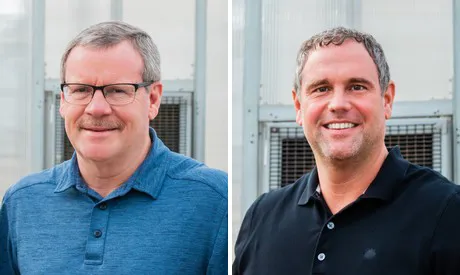Atlas Greenhouses has been a greenhouse manufacturer since the mid-1980s, manufacturing commercial greenhouses. “Through the years, we have set up all types of greenhouses for all kinds of crops,” says Dave Bishop with Atlas Greenhouses. “3, 4 years ago, we entered the cannabis and hemp market as well.”
Vegetable and cannabis growers
When the cannabis industry became regulated, many growers found themselves with a great availability of new technology and opportunities that they could not make use of before. This is something definitely different from their food horticulture colleagues, who have always relied on the most recent tools and methods, derived from years of research and trial and error. “Most vegetable growers were already knowledgeable,” Dave says. “They were taking an outdoor crop into an indoor environment, and they were basically refining that to get a greater yield. The situation for cannabis growers was very different.”
 From the left: Dave Bishop and Chris Kirschner
From the left: Dave Bishop and Chris Kirschner
“Cannabis growers used to grow in illegal settings, on a very small scale, like a basement or a garage. They did not use any greenhouse settings for their cannabis cultivation. However, cannabis growers started realizing that they could cut expenses by using greenhouses, because the most expensive part of growing cannabis is related to the electricity consumption, and with greenhouses they could grow under free sunlight, but most of them didn’t know how to properly capitalize on this.”
Climbing a steep learning curve
This is why, initially, cannabis companies tried to hire growers from other industries. “But the cannabis plant is so different in terms of requirements compared to other types of crops, that hiring such people was largely unsuccessful. The learning curve has been particularly steep in the first couple of years.”
This learning curve has been made even more steep because of the aura of secrecy that surrounded legal cannabis operations. “One of the things that I have noticed is that horticulture and agriculture communities are very open, and they can also rely on universities that carry out research and share their findings,” Chris Kirschner with Atlas Greenhouses remarks. “With the cannabis industry, you have a very secretive and hush hush industry. This is because it is a very competitive and financially lucrative industry, so if one is successful, they think they have the secret sauce, and they don’t want anybody to know what they are doing.”
“The problem with such an attitude is that it hurts the industry rather than helping it. However, universities are now getting involved, companies are sharing data. Everybody starts opening up, and everyone will benefit greatly from that.”
The benefits of a cannabis greenhouse
Chris and Dave have been in the horticultural industry for more than 20 years, and they have seen many different kinds of growers. “A greenhouse is a very agricultural tool,” Dave points out. “And oftentimes people have expectations that do not match the reality. External weather conditions influence the environment within a greenhouse, and some growers think that they can change the climate in a greenhouse instantly. Controlling the climate is challenging, and this also means that what works in a specific location might not work in another. One has to adapt to the environment in which the cultivation is occurring. And this is where we come into play.”
“Having the experience that we have, we help growers to understand what is going to work in this or that environment. Education is paramount, and we show growers facts and data on climate, humidity, and so forth, to educate them from the very beginning on why something would work or why it wouldn’t work.” At the same time, Chris and Dave point out that their mission is especially to help growers make an informed decision. “It is our job to give them the puzzle pieces to make that decision in an educated way. Here is the path and the tools we have here, and this is what it's going to cost: hybrid greenhouse, traditional greenhouse, all of them have pros and cons.”
The importance of making an informed decision
It is of the utmost important to be aware of the complexities that such a decision involves. “The money spent on horticulture or floriculture operations are not as much as for a cannabis crop,” Dave points out. “The value of the cannabis crop is what really sets apart cannabis growers from other growers. Thus, it is crucial to give customers the knowledge, because the ROI is so much faster to get back.”
This is also the reason why Atlas Greenhouses establishes long-lasting relationships with its customers. “As soon as the process is far enough along and they decide to go down that path, we become a major part of their life,” Chris says. “We are completely immersed in their endeavor, and we speak with architects, engineers, growers: this is because what cannabis growers really need is a trusted resource where they can get the answers and the advice they need, and that’s what we do and what it has to be.”
Chris and Dave point out that the majority of Atlas’s R&D is geared toward cannabis. “We are staying at the forefront in order to be ready for what lies ahead,” Dave says. “In a not so distant future, the industry is going to open up, thus sharing the knowledge necessary to allow the sector as a whole to advance. This is the key part that this industry is missing right now. We need to connect people on a human level, thus allowing growers to proactively share knowledge, so that they will become the trusted resources. As a company, we strive for that: we are fully injected in the cannabis industry, and this is where we want to go,” Chris concludes.
For more information:
Atlas Greenhouse
9596 US 82 Alapaha, GA 31622
(800) 346-9902
[email protected]
atlasgreenhouse.com
